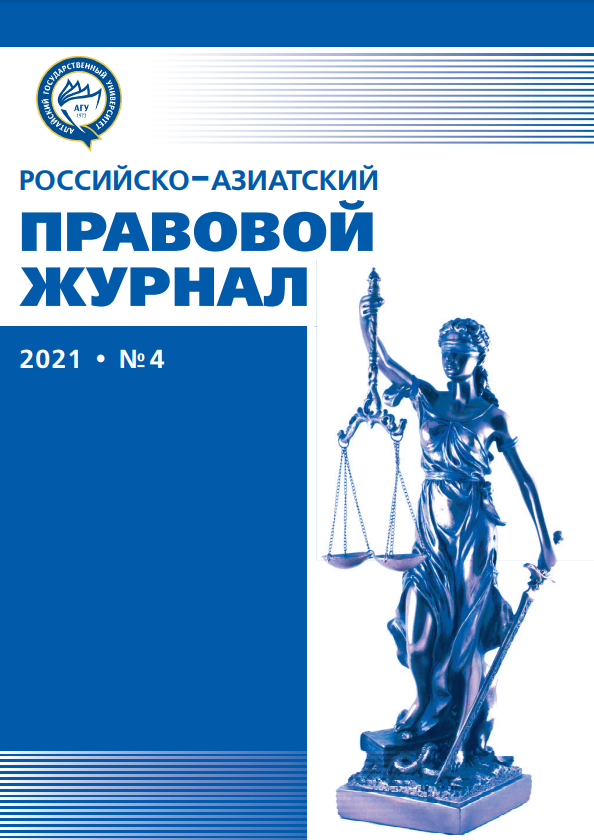ELECTRONIC DATABASES AS A SOURCE OF OBTAINING DATA FOR THE CIRCUMSTANCES TO BE PROVEN IN A CRIMINAL CASE
УДК 343.141 ББК 67.410.204.13
Abstract
The article provides an analysis of the sources of obtaining evidentiary and other information necessaryfor the investigation body, the prosecutor (state prosecutor) and the court to implement the provisions on theconfiscation of property under Art. 104.1 of the Criminal Code of the Russian Federation. With examples fromthe judicial practice of the federal court and the positions of the Supreme Court of the Russian Federation,set out in the Resolution of the Plenum, the issue of obtaining information from electronic databases aboutthe property status of a participant in criminal proceedings is considered. The possibilities of GAS “Justice” ofPI “Judicial record-keeping” on the issues under consideration are revealed. The conclusion is substantiatedthat the conclusion that electronic databases can and should be used as a source of obtaining data for thecircumstances to be proved in a criminal case. Taking into account the provisions of Articles 73 and 74 of theCriminal Procedure Code of the Russian Federation, the place and type of information received, using theseelectronic databases, in the evidence system in a criminal case, is determined. The conclusion is substantiatedthat the list of compositions (articles) of the Criminal Code of the Russian Federation, according to which itis possible to apply confiscation by a conviction of a court, is practically unlimited, and, to be more precise,is limited only to the list of articles of the Special Part of the said code.
Downloads
References
Соловьева К. Некоторые аспекты доказывания по уголовным делам о неисполнении обязанностей по воспитанию несовершеннолетнего // Дружба народов без границ: экономика, общество, культура : cборник материалов XII Международной научно-практической конференции молодых ученых, аспирантов, студентов, школьников. Ставрополь, 2018.
Самойлова Ю.Б. Конфискация имущества по уголовным делам о коррупционных преступлениях: вопросы правоприменения // Проблемы противодействия коррупции на государственной и муниципальной службе и пути их решения в современной России : материалы участников круглого стола с международным участием. Ростов-на-Дону, 2018. С. 429–434.
Гордеев А.Ю. К вопросу о проблемах конфискации имущества по уголовным делам коррупционной направленности // Аграрное и земельное право. 2018. №9 (165). С. 113–116.
Вдовцев П.В. Конфискация имущества при прекращении уголовного дела по нереабилитирующим основаниям // Российский следователь. 2021. №9. С. 34–37. DOI10.18572/1812–3783–2021–9–34–37.
Гусак В.А., Никулочкин Е.О., Сергеев А.Б. Особенности производства по уголовным делам при установлении обстоятельств, подтверждающих наличие подлежащих конфискации денежных средств и имущества, приобретённых в результате незаконного сбыта наркотических веществ. Челябинск, 2016. 195 с.
Волеводз А. Г., Соловьев А. Б. Международный розыск, арест, конфискация и передача иностранным государствам денежных средств и имущества, полученных преступным путем, а также вещественных доказательств по уголовным делам. М., 2007. 440 с. (Библиотека международного права). ISBN 978–5–93295–310–5.
Дударев М. Обстоятельства, подлежащие исследованию, по делам о совершении незаконных действий в отношении имущества, подвергнутого описи или аресту либо подлежащего конфискации // Законность. 2008. №2 (880). С. 17–22.
Куракин А.В., Карпухин Д.В. Реализация конфискации как меры принудительного характера в таможенной сфере: анализ решений Европейского суда по правам человека // Современное право. 2021. №5. С. 48–55. DOI 10.25799/NI.2021.40.24.009.
Лаврова О.Н. Об установлении цели, оснований и условий при наложении ареста на имущество в ходе досудебного производства по уголовному делу // Евразийский юридический журнал. 2017. №1 (104). С. 238–240.
Russian-Asian Law Journal is a golden publisher, as we allow self-archiving, but most importantly we are fully transparent about your rights.
Authors may present and discuss their findings ahead of publication: at scientific conferences, on preprint servers, in public databases, and in blogs, wikis, tweets, and other informal communication channels.
Russian-Asian Law Journal allows authors to deposit manuscripts (currently under review or those for intended submission) in non-commercial, pre-print servers such as ArXiv.
Authors who publish with this journal agree to the following terms:
- Authors retain copyright and grant the journal right of first publication with the work simultaneously licensed under a Creative Commons Attribution License that allows others to share the work with an acknowledgement of the work's authorship and initial publication in this journal.
- Authors are able to enter into separate, additional contractual arrangements for the non-exclusive distribution of the journal's published version of the work (e.g., post it to an institutional repository or publish it in a book), with an acknowledgement of its initial publication in this journal.
- Authors are permitted and encouraged to post their work online (e.g., in institutional repositories or on their website) prior to and during the submission process, as it can lead to productive exchanges, as well as earlier and greater citation of published work (See The Effect of Open Access).








